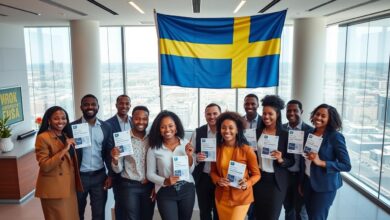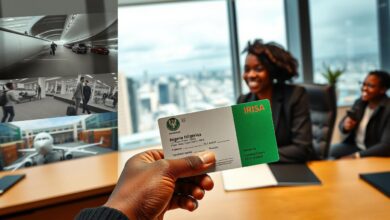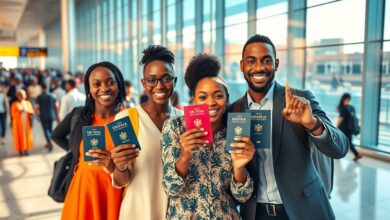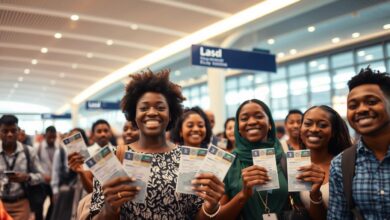Visa Sponsorship USA: Opportunities for Nigerian Professionals
Employer-sponsored work visas are key for Nigerian professionals wanting to work in the US. This article shows how to get a Visa Sponsorship USA and US Work Sponsorship. It explains the different visa types and what employers and applicants need to do.
Nigeria has many skilled graduates in IT, engineering, and healthcare. They seek Job sponsorship in America for better pay and career growth. The US offers higher wages, training, and professional networks that attract many.
This article covers H-1B, L-1, and O-1 visas, as well as green cards. It also talks about networking and job fairs. Remember, this is just for information. For specific advice, talk to employers, immigration lawyers, or official sources like USCIS and the U.S. Department of State.
Readers will find details on eligibility, employer roles, timelines, and costs. This information can help increase your chances of getting US employer sponsorship and relocating to the USA successfully.
Understanding Visa Sponsorship for Work in the USA
Visa sponsorship means a U.S. employer promises to help a foreign worker get a job legally in the U.S. This promise can be for a temporary or permanent job. Employers must file papers with U.S. Citizenship and Immigration Services (USCIS) or get Labor Condition Applications from the Department of Labor.
There are two main types of sponsorship. Temporary sponsorship is for visas like H-1B, L-1, and O-1. Permanent sponsorship leads to green cards under EB-2 and EB-3. Each type has its own paperwork, timelines, and requirements.
Employer sponsorship is key for foreign professionals to work legally in the U.S. Without a sponsor, most can’t take U.S. jobs. Sponsored workers get U.S. labor protections, better pay, and a chance for permanent residency.
Before sponsoring, employers think about their business needs, wages, and immigration steps. Fields like tech, healthcare, finance, and academia often sponsor due to specific talent needs.
Nigerians looking into sponsorship should know about official resources. USCIS, the Department of Labor, and the U.S. Department of State provide the latest information. These agencies explain the steps for employers and applicants in different immigration paths.
What is Visa Sponsorship?
Visa sponsorship is when an employer promises to support a foreign worker’s job application in the U.S. The employer must submit petitions showing the job offer, the worker’s skills, and U.S. labor law compliance. This includes wage attestations, skill evidence, and job descriptions.
The Importance of Visa Sponsorship for Foreign Workers
Sponsorship allows foreign workers to legally work and enjoy workplace protections. It also leads to higher-paying jobs that might not be available locally. For many, Work permit sponsorship USA is a crucial step toward long-term career growth in the U.S.
Employer sponsorship is crucial for job opportunities at U.S. firms. Both employers and candidates need to understand immigration paths to plan job searches, interviews, and relocation.
Types of Work Visas Available in the USA
The United States offers several visa paths for Nigerian professionals seeking USA sponsored jobs. Each route answers a different career stage and employer need. This section outlines three common options and what applicants should expect when pursuing work authorization.
H-1B option for specialty occupations
The H-1B visa is for skilled hires in fields like engineering, IT, and finance. Employers must show the job is a specialty occupation and file Form I-129 with an approved Labor Condition Application. Applicants usually need at least a bachelor’s degree or equivalent experience.
The program has an annual cap of 65,000 visas plus 20,000 for U.S. master’s degree holders. Selection is often by lottery when demand exceeds supply. Some employers, like accredited universities, are cap-exempt. The initial H-1B term is up to three years and can be extended to six years in most cases. Further extensions may be available when an employer begins green card processing.
L-1 option for intra-company transfers
The L-1 visa helps multinational companies move experienced employees from an overseas office to a U.S. parent, affiliate, or subsidiary. Employers use this path to place managers, executives, or staff with specialized knowledge into U.S. roles.
To qualify, the applicant must have worked for the foreign entity for at least one continuous year within the prior three years. L-1A covers managerial or executive transfers and can last up to seven years. L-1B serves employees with specialized knowledge and can last up to five years. Dual intent is permitted, so beneficiaries may pursue permanent residency while on the L-1 visa.
This visa is common among Nigerian firms with U.S. branches and international tech companies that need to move proven staff quickly for projects or leadership roles.
O-1 option for extraordinary ability
The O-1 visa targets individuals who show sustained national or international acclaim in sciences, arts, education, business, or athletics. Evidence can include major awards, high salary compared with peers, published work, notable media coverage, and strong letters of recommendation from recognized authorities in the field.
O-1 approvals are tied to specific events or employment but can be extended as long as qualifying work continues. Practitioners often use this visa for high achievers whose credentials exceed typical skilled worker demand America sees through standard channels.
- H-1B suits routine skilled hires who meet degree requirements and face an annual cap.
- L-1 fits employees moving within the same company to support global operations.
- O-1 benefits leaders with a record of exceptional achievement and documented acclaim.
Choosing the right path depends on career history, employer type, and how a candidate matches the evidence or degree criteria. Each visa plays a role in meeting Skilled worker demand America experiences across industries. It helps employers fulfill hiring needs through USA sponsored jobs.
Eligibility Requirements for Visa Sponsorship
Before you apply, it’s important to know what U.S. immigration and employers expect. You need clear documents, a real job offer, and employer compliance. These are key for many work visas.
General Requirements for Nigerian Professionals
Nigerian applicants need valid passports and must pass background checks. They also need a real job offer from a U.S. employer. The employer must show they can pay the required wage and file the needed immigration papers.
Having a criminal record or past immigration issues can stop you from getting a visa. Gather all your civil and criminal records, school documents, and work references before you apply.
Educational and Professional Qualifications
For H-1B visas and many green cards, a U.S. bachelor’s degree or its foreign equivalent is needed. If your degree is from outside the U.S., you might need to use services like World Education Services to prove it’s equal.
Work experience can sometimes replace a degree. USCIS has rules that say three years of work experience can be equal to one year of college. This depends on the visa type and the proof you provide.
Jobs in regulated fields need U.S. licenses or certifications. Doctors must pass USMLE steps and get state medical licenses. Nurses need to pass NCLEX and meet state board rules. Engineers might need state approvals or certifications to work.
Language Proficiency Factors
Being good at English can help you get jobs and fit in at work. Employers might ask for IELTS or TOEFL scores for jobs that need good communication. While U.S. immigration rules don’t always require language tests, speaking well is important for getting hired and staying in the U.S.
Skills like teamwork, being on time, and clear communication are also key. Showing these skills can help Nigerian professionals find better jobs in the U.S. and get work permits.
The Application Process for Work Visas
Getting a U.S. work visa has clear steps and needs employer help. Nigerian professionals should know the process starts with job hunting and ends with getting the visa. This guide will walk you through the steps, employer roles, and timing to help you plan.
Steps to secure a visa sponsorship
- Look for sponsored jobs on company websites, LinkedIn, and visa job boards like MyVisaJobs and H1BGrader.
- Get a job offer that includes job title, duties, salary, and a statement that the job is sponsored.
- The employer files the necessary petitions, like Form I-129 for H-1B, L-1, or O-1. H-1B needs a Labor Condition Application first.
- After USCIS approves the petition, you apply at the U.S. Embassy or Consulate in Nigeria. You’ll have an interview and get the visa stamp.
Role of employers in the sponsorship process
- Employers prepare the petition, prove they can pay, and follow U.S. labor laws. They handle all the paperwork.
- Many companies use immigration law firms like Fragomen or Berry Appleman & Leiden to make sure everything is done right.
- For green cards, employers may do domestic recruitment or PERM labor certification before filing immigrant petitions.
Timeline visa application USA
- H-1B has an annual cycle: electronic registration in March, lottery in April, then petition adjudication over weeks or months. Premium processing makes USCIS decisions in 15 days.
- L-1 and O-1 petitions don’t go through the lottery. Adjudication time varies by case and service center. Premium processing is available to speed things up.
- Consular processing takes several weeks for interview scheduling and visa issuance. Security checks, RFEs, or administrative processing can make it longer.
Good documentation, quick employer action, and realistic timing are key. Prospective migrants should follow each step closely and keep in touch with their employer or legal counsel.
Costs Associated with Visa Sponsorship
Visa sponsorship comes with several costs. People from Nigeria should understand these to plan their finances and talk with potential employers.
There are two main types of costs: government fees and third-party expenses. Government fees include USCIS petition costs and consular application fees. Third-party costs are for legal advice, credential checks, and travel for interviews.
Application Fees and Other Expenses
USCIS petition fees start with a base filing fee. Employers might also pay a fraud prevention fee, an ACWIA fee, a public law 114-113 fee, and optional premium processing.
Consular fees include the MRV application fee and possible reciprocity fees. Applicants must pay for medical exams and travel to embassy interviews. Legal fees for preparing the petition can also be high.
- USCIS petition and supplemental fees
- MRV and consular fees
- Medical exam and travel expenses
- Attorney fees, translations, and credential evaluations
- Professional licensing and relocation expenses
Who Covers the Costs?
U.S. Department of Labor and USCIS rules say employers must pay some fees and offer the prevailing wage. Big tech companies and major healthcare providers usually cover most of the costs.
Some costs are usually the applicant’s responsibility. These include the MRV fee, medical exam, travel to the embassy, and credential checks. Employers might pay these back, so it’s important to ask about it when offered a job.
- Ask for a written breakdown of who pays which fees before accepting a job.
- Confirm whether the employer covers attorney and filing fees like the ACWIA or fraud fee.
- Budget for personal items such as medical exams, MRV fees, and travel.
Challenges Faced by Nigerian Professionals
The journey to legal work in the U.S. is tough for Nigerians. They face delays, employer doubts, and uncertainty. This affects their career and family plans.
Common Obstacles in the Sponsorship Process
The H-1B lottery is very unpredictable. Many qualified people have plans delayed when their petitions aren’t picked. This makes them look for other jobs or wait a year to try again.
Small companies often don’t sponsor due to costs and paperwork. Employers who don’t know immigration law prefer those with valid work permits. This limits job options for Nigerian professionals.
Getting foreign credentials recognized is hard. Licensing boards and employers need U.S. equivalency checks. Health workers, engineers, and teachers must pass extra exams or get local certifications.
Requests for Evidence and denials can slow petitions. If documents are missing, job classification is disputed, or specialty occupation status is questioned, delays happen. Consular interviews and embassy processing add more uncertainty.
Navigating Immigration Laws and Regulations
U.S. policies change often, and understanding them can be tricky. Those not up-to-date on wage rules, H-1B criteria, or visa types risk mistakes. Keeping informed helps avoid rejections.
Having a good lawyer is key. Immigration attorneys help write better petitions, answer RFEs, and suggest other options. Many Nigerians find that legal advice improves their chances and speeds up the process.
Employers must follow rules to avoid fines. They need to meet wage, posting, and recordkeeping rules. Employees should not work illegally or stay too long on a visa to keep future sponsorship chances open.
There are useful resources for preparation. USCIS policy manuals, Department of Labor guidelines, and U.S. Embassy updates help. Using these resources helps tackle visa sponsorship challenges, overcome Nigerian relocation obstacles, and navigate U.S. immigration laws.
Alternative Pathways to Work in the USA
Many Nigerian professionals look for ways to work in the United States long-term. This section talks about key options and how to prepare and network for success.
Employment-based green cards give permanent residency through employer sponsorship or self-petition. It’s important to know the different categories and what each requires.
EB-1 is for priority workers like those with extraordinary ability or multinational executives. EB-2 is for professionals with advanced degrees or exceptional ability. EB-3 is for skilled workers and professionals who meet labor requirements.
For EB-2 and EB-3, employers need to get a PERM labor certification. This shows the U.S. labor market is open. Some can skip employer sponsorship in EB-2 if their work benefits the country in areas like research or technology.
Processing times and backlogs differ by category and country. It’s crucial to watch the Visa Bulletin and talk to immigration counsel. This helps manage priority dates and timelines.
The right network can open doors that paperwork alone can’t. Use LinkedIn and join professional associations like the Institute of Electrical and Electronics Engineers. This makes you more visible to U.S. employers.
Job fairs, university career events, and industry conferences offer direct access to recruiters. Virtual fairs reach more people, but in-person events make a stronger impression.
- Leverage alumni networks and Nigerian diaspora groups for referrals and mentorship.
- Work with recruitment agencies and global mobility firms for sponsored roles.
- Make a U.S.-style resume and practice interviews before reaching out.
Be clear about sponsorship needs early in the hiring process. Knowing about Employment-Based Green Cards and networking can help secure permanent roles.
Success Stories of Nigerians in the USA
Many Nigerian professionals have found success in the U.S. They show how important it is to be persistent, have the right documents, and get employer support. Their stories highlight the steps to stable jobs and long-term residency.
Case studies visa sponsorships
In tech, a Nigerian software engineer got a computer science degree. He then landed a job with a major tech firm through remote interviews. The company sponsored his H-1B visa and later an EB-2 petition for permanent residency.
In healthcare, a Nigerian nurse passed the NCLEX and got a job at a U.S. hospital. A doctor followed a similar path, passing USMLE steps and getting a visa and green card through his employer.
Corporate transfers also work. A professional from a Lagos-based firm moved to the U.S. on an L-1 transfer. The company supported his transfer, leading to new career opportunities.
Contributions of Nigerians to the U.S. workforce
Nigerian professionals bring value in STEM, healthcare, finance, and academia. Their skills and drive boost innovation and problem-solving in teams. Employers value their diverse perspectives.
They also integrate into communities. Many mentor students, join associations, and volunteer. This strengthens workplace relationships and helps local economies.
Role models inspire others. Prominent Nigerians in the diaspora show success is possible. Their stories motivate others to follow documented paths and seek employer support.
Future Prospects for Nigerian Professionals
The future for Nigerian professionals looking to work in the USA is bright. They need a smart plan to succeed. Jobs in demand include software development, data science, and nursing. Remote work also opens doors, leading to sponsorship if the company grows.
Trends in the U.S. job market
Big companies like Amazon and Google often sponsor talent. They work with universities to find the best candidates. Smaller companies also sponsor when they can’t find local talent, especially in tech and healthcare.
How to stay updated on visa policies
To keep up with visa rules, check USCIS and the U.S. Department of State websites. Follow law firms like Fragomen for updates. Join LinkedIn groups and sign up for immigration newsletters to stay informed.
It’s important to be ready: keep your skills up to date and build connections. By doing this, Nigerian professionals can increase their chances of getting a visa and finding success in the U.S. job market.
FAQ
What is visa sponsorship and why is it important for Nigerian professionals seeking work in the USA?
Visa sponsorship means a U.S. employer promises to help a foreign worker get a visa. It’s key because most Nigerian professionals need this to legally work in the U.S. and get permanent residency. Employers file papers with USCIS and get special permits from the Department of Labor.
Which employer-sponsored U.S. work visas are most relevant to Nigerian applicants?
Important visas include H-1B for certain jobs, L-1 for moving within companies, and O-1 for those with special talents. There are also green cards for permanent work. Each has its own rules and timelines, so it’s important to find the right one for your skills and goals.
What are the basic eligibility requirements Nigerian professionals must meet for employer sponsorship?
You need a real job offer from a U.S. employer, the right education or experience, and valid travel documents. Employers must show they can pay the required wage and meet all filing needs. Some jobs, like doctor or nurse, might need U.S. licenses.
How does the H-1B cap and lottery affect chances of getting sponsored?
The H-1B has a yearly limit of 65,000 visas plus 20,000 for master’s degree holders. Since demand is high, USCIS uses a lottery. This makes it hard to predict if you’ll get a visa, especially for new graduates. Some employers, like universities, are not affected by the lottery.
What steps should a Nigerian applicant follow to secure employer sponsorship?
Look for jobs that offer sponsorship on company websites, LinkedIn, and job boards. Get a job offer that includes sponsorship details. The employer then files the necessary papers. After approval, you apply for a visa at the U.S. Embassy in Nigeria.
Who pays the costs for visa sponsorship and what fees are involved?
Employers usually pay some fees and must offer the minimum wage. They cover costs like petition fees and often hire immigration lawyers. You might need to pay for your visa, medical exams, and travel. Make sure to discuss who pays what before accepting a job.
How long does the sponsorship and visa process usually take?
The time varies by visa type. H-1B petitions are filed in April and can take months. L-1 and O-1 petitions are faster. After USCIS approves your petition, getting a visa can take weeks, depending on embassy schedules.
What common challenges do Nigerian professionals face when seeking U.S. sponsorship?
Challenges include the H-1B lottery, employer hesitation, and needing U.S. licenses. There are also risks of petition denials and delays. Working with immigration lawyers can help strengthen your application.
Are there alternative pathways besides employer-sponsored nonimmigrant visas?
Yes. There are green cards for permanent work, like EB-1, EB-2, and EB-3. You can also get visas for exceptional talent or through intra-company transfers. Networking and job fairs can help find sponsorship opportunities.
How can Nigerian professionals improve their chances of getting sponsored by a U.S. employer?
Improve your credentials with U.S.-equivalent degrees or evaluations. Gain in-demand skills and speak English well. Tailor your resume for U.S. jobs and network through LinkedIn and professional groups. Be open about your sponsorship needs early in job talks.
What role do U.S. immigration attorneys and major law firms play in sponsorship?
Immigration lawyers help employers prepare petitions and respond to requests for evidence. They ensure compliance and advise on strategy. Employers often hire lawyers to reduce risks. This helps applicants by ensuring accurate and timely filings.
Where should applicants look for authoritative, up-to-date information on visa rules and procedures?
Check USCIS.gov, the U.S. Department of Labor, and the U.S. Department of State visa pages. For country-specific advice, visit the U.S. Embassy in Abuja and the U.S. Consulate in Lagos. Immigration law firm blogs and professional associations also offer updates.
Can prior work experience substitute for formal education in visa eligibility?
Sometimes, work experience can replace a degree, based on USCIS rules. This varies by visa type and needs careful documentation. Credential evaluation services can help match foreign qualifications to U.S. standards.
How do Nigerian healthcare professionals obtain sponsorship and practice in the U.S.?
Healthcare workers must pass U.S. licensing exams and get their credentials verified. They need a job offer from a U.S. hospital or health system. Many hospitals and staffing agencies help with visa petitions and relocation.
What are realistic future prospects for Nigerians aiming for U.S. work sponsorship?
There’s strong demand in tech, healthcare, engineering, finance, and research. Remote work may open new sponsorship paths. Stay updated, upskill, and network to improve your chances. Large employers and universities actively recruit international talent.





